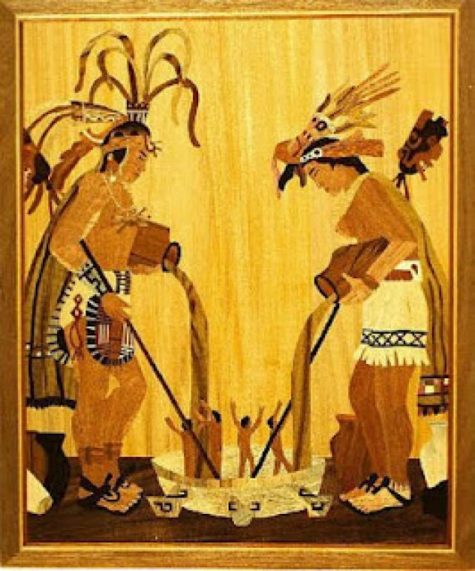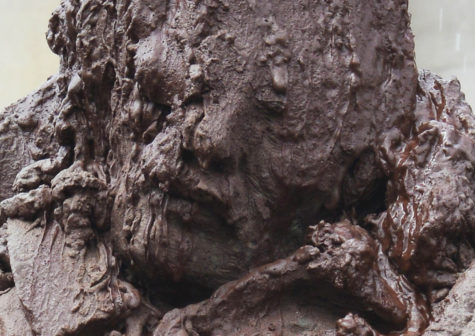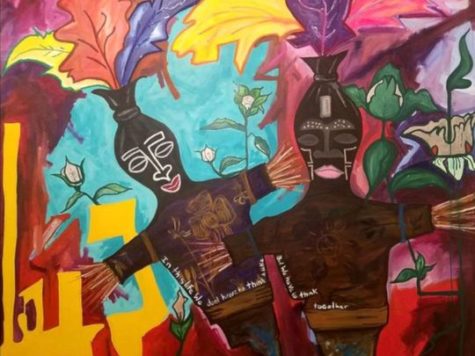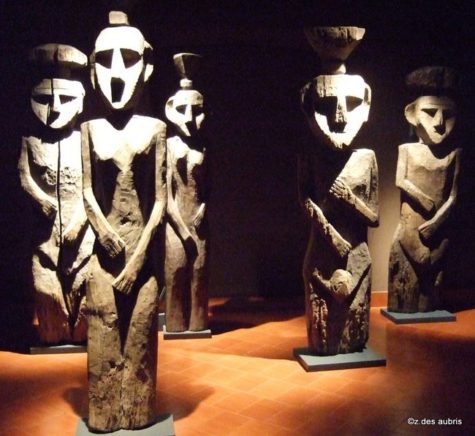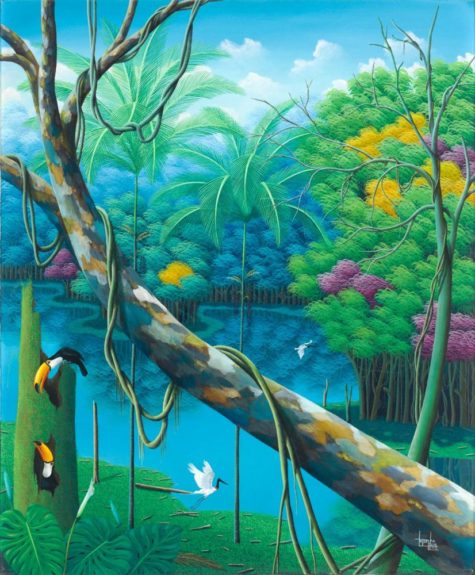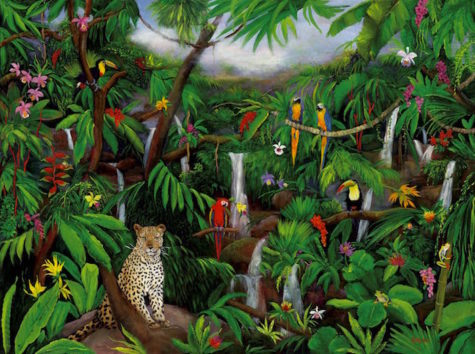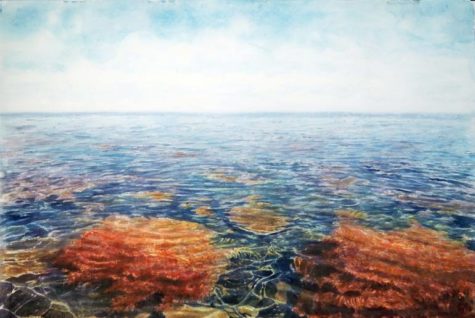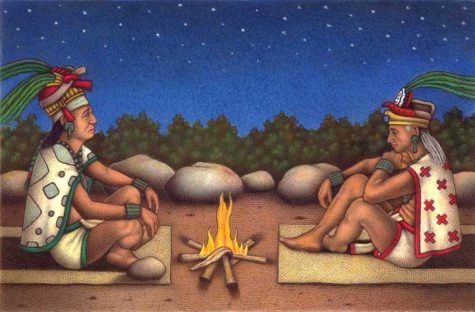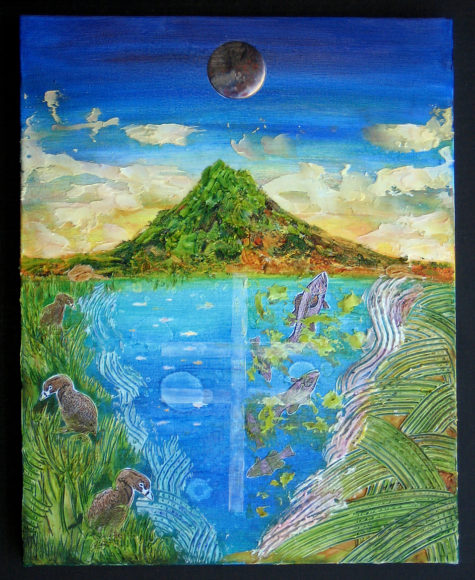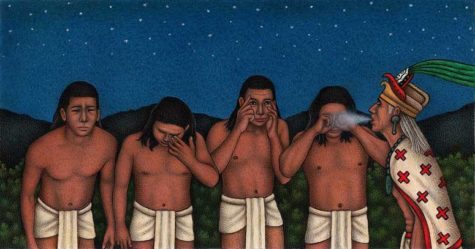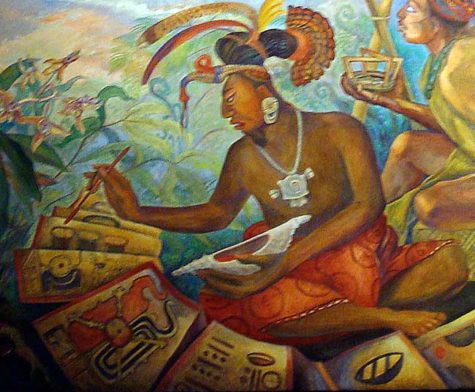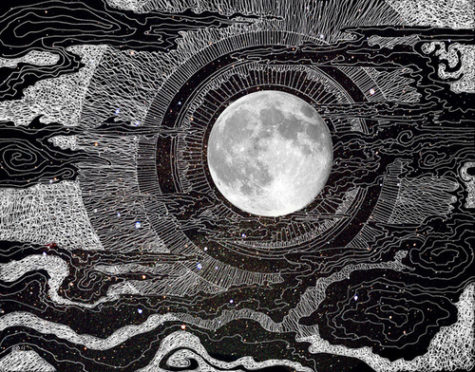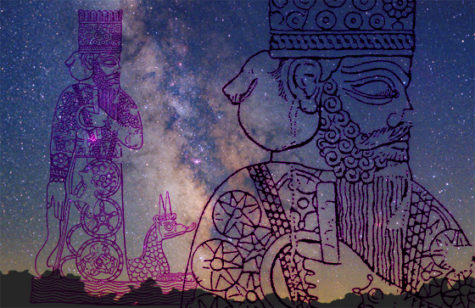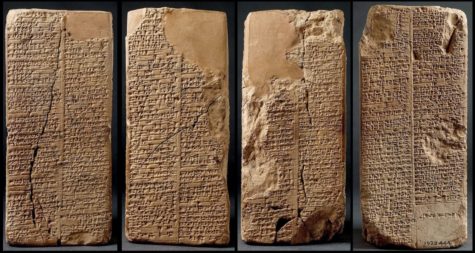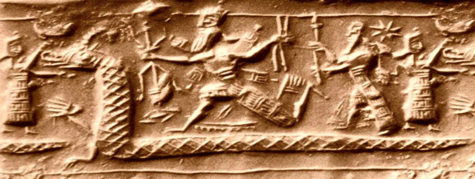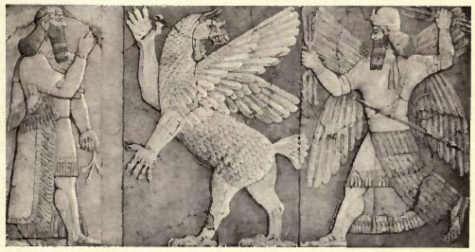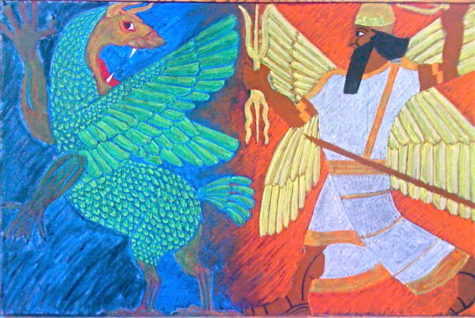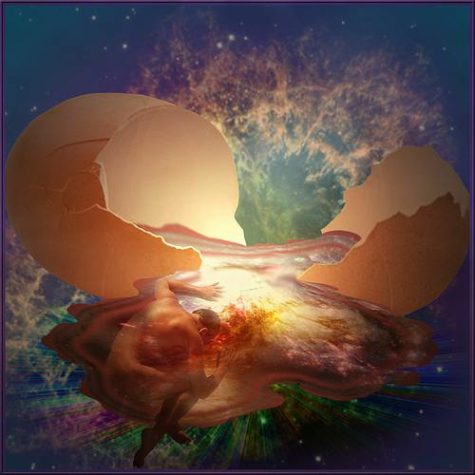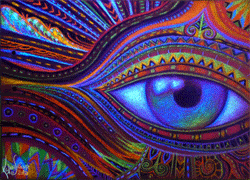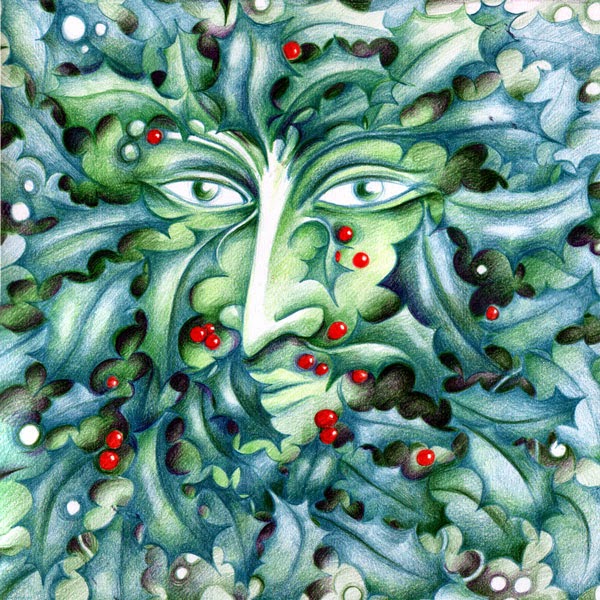Creation Stories
The First Humans ~ An Experiment
From the Mayan Book of the Dawn of Life, we have this account of the Gods first experiment with creating humans. This experiment was undertaken because the final result of the creation of the animals did not go as planned.
Again there comes an experiment with the human work, the human design, by the Maker, Modeler, Bearer, Begetter:
“It must simply be tried again. The time for the planting and dawning is nearing. For this we must make a provider and nurturer. How else can we be invoked and remembered on the face of the earth? We have already made our first try at our work and design, but it turned out that they didn’t keep our days, nor did they glorify us.
“So now let’s try to make a giver of praise, giver of respect, provider, nurturer,” they said. So then comes the building and working with earth and mud. They made a body, but it didn’t look good to them. It was just separating, just crumbling, just loosening, just softening, just disintegrating, and just dissolving. Its head wouldn’t turn, either. Its face was just lopsided, its face was just twisted. It couldn’t look around. It talked at first, but senselessly. It was quickly dissolving in the water.
“It won’t last,” the mason and sculptor said then. “It seems to be dwindling away, so let it just dwindle. It can’t walk and it can’t multiply, so let it be merely a thought,” they said. So then they dismantled, again they brought down their work and design.
Again they talked: “What is there for us to make that would turn out well, that would succeed in keeping our days and praying to us?” they said.
Then they planned again: “We’ll just tell Xpiyacoc, Xmucane, Hunahpu Possum, Hunahpu Coyote, to try a counting of days, a counting of lots,” the mason and sculptor said to themselves. Then they invoked Xpiyacoc, Xmucane. Then comes the naming of those who are the midmost seers: the “Grandmother of Day, Grandmother of Light,” as the Maker, Modeler called them. These are names of Xpiyacoc and Xmucane.
When Hurricane had spoken with the Sovereign Plumed Serpent, they invoked the daykeepers, diviners, the midmost seers: “There is yet to find, yet to discover how we are to model a person, construct a person again, a provider, nurturer, so that we are called upon and we are recognized: our recompense is in words.
Midwife, matchmaker,
our grandmother, our grandfather,
Xpiyacoc, Xmucane,
let there be planting, let there be the dawning
of our invocation, our sustenance, our recognition
by the human work, the human design,
the human figure, the human mass.
So be it, fulfill your names:
Hunahpu Possum, Hunahpu Coyote,
Bearer twice over, Begetter twice over,
Great Peccary, Great Tapir,
lapidary, jeweler,
sawyer, carpenter,
Maker of the Blue-Green Plate,
Maker of the Blue-Green Bowl,
incense maker, master craftsman,
Grandmother of Day, Grandmother of Light.
You have been called upon because of our work, our design. Run your hands over the kernels of corn, over the seeds of the coral tree, just get it done, just let it come out whether we should carve and gouge a mouth, a face in wood,” they told the daykeepers.
And then comes the borrowing, the counting of days; the hand is moved over the corn kernels, over the coral seeds, the days, the lots.
Then they spoke to them, one of them a grandmother, the other a grandfather. This is the grandfather, this is the master of the coral seeds: Xpiyacoc is his name. And this is the grandmother, the daykeeper, diviner who stands behind others: Xmucane is her name.
And they said, as they set out the days:
“Just let it be found, just let it be discovered,
say it, our ear is listening,
may you talk, may you speak,
just find the wood for the carving and sculpting
by the builder, sculptor.
Is this to be the provider, the nurturer
when it comes to the planting, the dawning?
You corn kernels, you coral seeds,
you days, you lots:
may you succeed, may you be accurate,”
they said to the corn kernels, coral seeds, days, lots.
“Have shame, you up there, Heart of Sky:
attempt no deception before the mouth and face
of Sovereign Plumed Serpent,”
they said. Then they spoke straight to the point: “It is well that there be your manikins, woodcarvings, talking, speaking, there on the face of the earth.” “So be it,” they replied.
The moment they spoke it was done: the manikins, woodcarvings, human in looks and human in speech.
This was the peopling of the face of the earth: They came into being, they multiplied, they had daughters, they had sons, these manikins, woodcarvings. But there was nothing in their hearts and nothing in their minds, no memory of their mason and builder. They just went and walked wherever they wanted. Now they did not remember the Heart of Sky.
And so they fell, just an experiment and just a cutout for humankind. They were talking at first but their faces were dry. They were not yet developed in the legs and arms. They had no blood, no lymph. They had no sweat, no fat. Their complexions were dry, their faces were crusty. They flailed their legs and arms, their bodies were deformed.
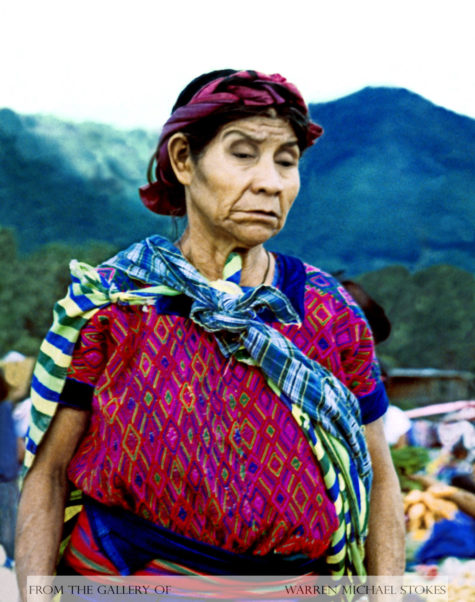
And so they accomplished nothing before the Maker, Modeler who gave them birth, gave them heart. They became the first numerous people here on the face of the earth.
From: Popol Vuh: the Mayan Book of the Dawn of Life
Why The Animals Became Food
This part of the Mayan Creation Story explains why animals became food.
Now they planned the animals of the mountains, all the guardians of the forests, creatures of the mountains: the deer, birds, pumas, jaguars, serpents, rattlesnakes, yellowbites, guardians of the bushes.
A Bearer, Begetter speaks: “Why this pointless humming? Why should there merely be rustling beneath the trees and bushes?”
“Indeed- they had better have guardians,” the others replied. As soon as they thought it and said it, deer and birds came forth.
And then they gave out homes to the deer and birds: “You, the deer: sleep along the rivers, in the canyons. Be here in the meadows, in the thickets, in the forests, multiply yourselves. You will stand and walk on all fours,” they were told.
So then they established the nests of the birds, small and great: “You, precious birds: your nests, your houses are in the trees, in the bushes. Multiply there, scatter there, in the branches of trees, the branches of bushes,” the deer and birds were told.
When this deed had been done, all of them had received a place to sleep and a place to stay. So it is that the nests of the animals are on the earth, given by the Bearer, Begetter. Now the arrangement of the deer and birds was complete.
And then the deer and the birds were told by the Maker, Modeler, Bearer, Begetter:
“Talk, speak out. Don’t moan, don’t cry out. Please talk, each to each, within each kind, within each group,” they were told the deer, birds, puma, jaguar, serpent. “Name now our names, praise us. We are your mother, we are our father. Speak now:
‘Hurricane, Newborn Thunderbolt, Raw Thunderbolt, Heart of Sky, Heart of Earth, Maker, Modeler, Bearer, Begetter,’ speak, pray to us, keep our days,” they were told.
But it didn’t turn out that they spoke like people: they just squawked, they just chattered, they just howled. It wasn’t apparent what language they spoke; each one gave a different cry.
When the Maker, Modeler heard this: “It hasn’t turned out well, they haven’t spoken,” they said among themselves. “It hasn’t turned out that our names have been named. Since we are their mason and sculptor, this will not do,” the Bearers and Begetters said among themselves.
So they told them: “You will simply have to be transformed. Since it hasn’t turned out well and you haven’t spoken, we have changed our word: “What you feed on, what you eat, the places where you sleep, the places where you stay, whatever is yours will remain in the canyons, the forests. Although it turned out that our days were not kept, nor did you pray to us, there may yet be strength in the keeper of days, the giver of praise whom we have yet to make. Just accept your service, just let your flesh be eaten.
“So be it, this must be your service,” they were told when they were instructed – the animals, small and great, on the face of the earth. And then they wanted to test their timing again, they wanted to experiment again, and they wanted to prepare for the keeping of days again. They had not heard their speech among the animals; it did not come to fruition and it was not complete.
And so their flesh was brought low: they served, they were eaten, they were killed – the animals on the face of the earth.
From: Popol Vuh: the Mayan Book of the Dawn of Life
The Mayan Creation Story
Now it still ripples, now it still murmurs, ripples, it still sighs, still hums, and it is empty under the sky. Here follow the first words, the first eloquence: There is not yet one person, one animal, bird, fish, crab, tree, rock, hollow, canyon, meadow, forest.
Only the sky alone is there; the face of the earth is not clear. Only the sea alone is pooled under all the sky; there is nothing whatever gathered together. It is at rest; not a single thing stirs. It is held back, kept at rest under the sky. Whatever there is that might be is simply not there: only the pooled water, only the calm sea, only it alone is pooled.
Whatever might be is simply not there: only murmurs, ripples, in the dark, in the night. Only the Maker, Modeler alone, Sovereign Plumed Serpent, the Bearers, Begetters are in the water, a glittering light. They are there, they are enclosed in quetzal feathers, in blue-green. Thus the name, “Plumed Serpent.” They are great knowers, great thinkers in their very being.
And of course there is the sky, and there is also the Heart of Sky. This is the name of the god, as it is spoken.
And then came his word, he came here to the Sovereign Plumed Serpent, here in the blackness, in the early dawn. He spoke with the Sovereign Plumed Serpent, and they talked, then they thought, then they worried.
They agreed with each other, they joined their words, their thoughts. Then it was clear, then they reached accord in the light, and then humanity was clear, when they conceived the growth, the generation of trees, of bushes, and the growth of life, of humankind, in the blackness, in the early dawn, all because of the Heart of Sky, named Hurricane. Thunderbolt Hurricane comes first, the second is Newborn Thunderbolt, and the third is Raw Thunderbolt.
So there were three of them, as Heart of Sky, who came to the Sovereign Plumed Serpent, when the dawn of life was conceived: “How should it be sown, how should it dawn? Who is to be the provider, nurturer?”
“Let it be this way, think about it: this water should be removed, emptied out for the formation of the earth’s own plate and platform, then comes the sowing, the dawning of the sky-earth. But there will be no high days and no bright praise for our work, our design, until the rise of the human work, the human design,” they said.
And then the earth arose because of them, it was simply their word that brought it forth. For the forming of the earth they said “Earth.”
It arose suddenly, just like a cloud, like a mist, now forming, unfolding. Then the mountains were separated from the water, all at once the great mountains came forth. By their genius alone, by their cutting edge alone they carried out the conception of the mountain-plain, whose face grew instant groves of cypress and pine.
And the Plumed Serpent was pleased with this: “It was good that you came, Heart of Sky, Hurricane, and Newborn Thunderbolt, Raw Thunderbolt. Our work, our design will turn out well,” they said.
And the earth was formed first, the mountain-plain. The channels of water were separated; their branches wound their ways among the mountains. The waters were divided when the great mountains appeared. Such was the formation of the earth when it was brought forth by the Heart of Sky, Heart of Earth, as they are called, since they were the first to think of it. The sky was set apart, and the earth was set apart in the midst of the waters.
Such was their plan when they thought, when they worried about the completion of their work.
From: Popol Vuh: the Mayan Book of the Dawn of Life
The First Four Humans
The first four humans, the first four earthly beings who were truly articulate when they moved their feet and hands, their faces and mouths, and who could speak the very language of the gods, could also see everything under the sky and on the earth. All they had to do was look around from the spot where they were, all the way to the limits of space and the limits of time.
But then the gods, who had not intended to make and model beings with the potential of becoming their own equals, blew mist into their eyes, and limited human sight to what was obvious and nearby. Nevertheless, the lords who once ruled a kingdom from a place called Quiche, in the highlands of Guatemala, once had in their possession the means for overcoming this nearsightedness, an ilbal, a “seeing instrument” or a “place to see”; with this they could know distant or future events. The instrument was not a telescope, not a crystal for gazing, but a book.
The Book:
The lords of Quiche consulted their book when they sat in council, and their name for it was Popol Vuh or “Council Book.” Because this book contained an account of how the forefathers of their own lordly lineages had exiled themselves from a faraway city called Tulan, they sometimes described it as “the writings about Tulan.”
Because a later generation of lords had obtained the book by going on a pilgrimage that took them across water on a causeway, they titled it “The Light That Came from Across the Sea.” And because the book told of events that happened before the first sunrise and of a time when the forefathers hid themselves and the stones that contained the spirit familiars of their gods in forests, they also titled it “Our Place in the Shadows.”
And finally, because it told of the first rising of the morning star and the sun and moon, and of the rise and radiant splendor of the Quiche lords, they titled it “The Dawn of Life.”
From: Popol Vuh: the Mayan Book of the Dawn of Life
The Creation of The Moon
The man cut his throat and left his head there.
The others went to get it.
When they got there they put the head in a sack.
Farther on the head fell out onto the ground.
They put the head back in the sack.
Farther on the head fell out again.
Around the first sack they put a second one that
was thicker.
But the head fell out just the same.
It should be explained that they were taking the head
to show to the others.
They did not put the head back in the sack.
They left it in the middle of the road.
They went away.
They crossed the river.
But the head followed them.
They climbed up a tree full of fruit
to see whether it would go past.
The head stopped at the foot of the tree
and asked them for some fruit.
So the men shook the tree.
The head went to get the fruit.
Then it asked for some more.
So the men shook the tree
so that the fruit fell into the water.
The head said it couldn’t get the fruit from there.
So the men threw the fruit a long way
to make the head go a long way to get it so they could go.
While the head was getting the fruit
the men got down from the tree and went on.
The head came back and looked at the tree
and didn’t see anybody
so went on rolling down the road.
The men had stopped to wait
to see whether the head would follow them.
They saw the head come rolling.
They ran.
They got to their hut they told the others that the head
was rolling after them and to shut the door.
All the huts were closed tight.
When it got there the head commanded them to open the doors.
The owners would not open them because they were afraid.
So the head started to think what it would turn into.
If it turned into water they would drink it.
If it turned into earth they would walk on it.
If it turned into a house they would live in it.
If it turned into a steer they would kill it and eat it.
If it turned into a cow they would milk it.
If it turned into a bean they would cook it.
If it turned into the sun
When men were cold it would heat them.
If it turned into rain the grass would grow and the
animals would crop it.
So it thought, and it said, “I will turn into the moon.”
It called, “Open the doors, I want to get my things.”
They would not open them.
The head cried. It called out, “At least give me
my two balls of twine.”
They threw out the two balls of twine through a hole.
It took them and threw them into the sky.
It asked them to throw it a little stick too
to roll the thread around so it could climb up.
Then it said, “I can climb, I am going to the sky.”
It started to climb.
The men opened the doors right away.
The head went on climbing.
The men shouted, “You going to the sky, head?”
It didn’t answer.
As soon as it got to the Sun
it turned into the Moon.
Toward evening the Moon was white, it was beautiful.
And the men were surprised
to see that the head had turned into the Moon.
~Anonymous
The Enuma Elish Simplified
This epic is one of the most important sources for understanding the Babylonian worldview, centered on the supremacy of Marduk and the creation of humankind for the service of the gods. Its primary original purpose, however, is not an exposition of theology but the elevation of Marduk, the chief god of Babylon, above other Mesopotamian gods.
The Enûma Eliš exists in various copies from Babylon and Assyria. The version from Ashurbanipal’s library dates to the 7th century BCE. The composition of the text probably dates to the bronze age, to the time of Hammurabi or perhaps the early Kassite era (roughly 18th to 16th centuries BCE), although some scholars favor a later date of c. 1100 BCE.
What follows is a summary of the information on the seven tablets:
Tablet 1
Apsu is the god of fresh water and thus male fertility. Tiamat, wife of Apsu, is the goddess of the sea and thus chaos and threat. Tiamat gives birth to Anshar and Kishar, gods who represented the boundary between the earth and sky (the horizon). To Anshar and Kishar is born Anu, god of sky, who in turn bears Ea.
These “sons of the gods” make so much commotion and are so ill-behaved that Apsu decides to destroy them. When Ea learns of the plan, he kills Apsu and with his wife Damkina establishes their dwelling above his body. Damkina then gives birth to Marduk, the god of spring symbolized both by the light of the sun and the lightning in storm and rain. He was also the patron god of the city of Babylon.
Meanwhile Tiamat is enraged at the murder of her husband Apsu, and vows revenge. She creates eleven monsters to help her carry out her vengeance. Tiamat takes a new husband, Kingu, in place of the slain Apsu and puts him in charge of her newly assembled army.
Tablet 2
Tiamat represents the forces of disorder and chaos in the world. In the cycle of seasons, Tiamat is winter and barrenness. In the second tablet, to avenge the murder of her husband Tiamat prepares to unleash on the other gods the destructive forces that she has assembled.
Ea learns of her plan and attempts to confront Tiamat. While the tablet is damaged, it is apparent that Ea fails to stop Tiamat. Then Anu attempts to challenge her but fails as well. The gods become afraid that no one will be able to stop Taimat’s vengeful rampage.
Tablet 3
Anshar’s minister Gaga is dispatched to the other gods to report the activities of Tiamat and to tell them of Marduk’s willingness to face her. Much of this tablet is poetic repetition of previous conversations.
Tablet 4
The council of the gods tests Marduk’s powers by having him make a garment disappear and then reappear. After passing the test, the council enthrones Marduk as high king and commissions him to fight Tiamat.
With the authority and power of the council, Marduk assembles his weapons, the four winds as well as the seven winds of destruction. He rides in his chariot of clouds with the weapons of the storm to confront Tiamat. After entangling her in a net, Marduk unleashes the Evil Wind to inflate Tiamat. When she is incapacitated by the wind, Marduk kills her with an arrow through her heart and takes captive the other gods and monsters who were her allies.
He also captured her husband Kingu. After smashing Tiamat’s head with a club, Marduk divided her corpse, using half to create the earth and the other half to create the sky complete with bars to keep the chaotic waters from escaping. The tablet ends with Marduk establishing dwelling places for his allies.
Tablet 5
Marduk builds dwelling places for the other gods. As they take their place, they establish the days and months and seasons of the year. Since this is a myth about the natural world, the “stations” that Marduk establishes for the gods correspond to the celestial luminaries that figured in Babylonian astrology. The phases (horns) of the Moon determine the cycles of the months. From the spittle of Tiamat Marduk creates rain for the earth.
The city of Babylon is established as the audience room of King Marduk.
Tablet 6
Marduk decides to create human beings, but needs blood and bone from which to fashion them. Ea advises that only one of the gods should die to provide the materials for creation, the one who was guilty of plotting evil against the gods. Marduk inquires of the assembly of the gods about who incited Tiamat’s rebellion, and was told that it was her husband Kingu.
Ea kills Kingu and uses his blood to fashion mankind so they can perform menial tasks for the gods. To honor Marduk, the gods construct a house for him in Babylon. After its completion, Marduk gives a great feast for the gods in his new house who all praise Marduk for his greatness in subduing Tiamat.
The first group of the fifty throne names of Marduk are recited.
Tablet 7
Continuation of praise of Marduk as chief of Babylon and head of the Babylonian pantheon because of his role in creation. The rest of Marduk’s fifty throne names declaring his dominion are recited. Final blessings on Marduk and instructions to the people to remember and recite Marduk’s deeds.
Source:The Voice
The Enûma Eliš
The version presented here is a combination of several translations but is substantially based on the translation of E. A. Speiser, with modifications based on various other translations. The translation of these texts is not exact. In some cases, badly damaged tablets make reading the text difficult. Some translators leave the gaps, while others attempt to reconstruct the text based on what remains. In other cases, there are differing interpretations of the meaning of words or the reading of the cuneiform itself. Many translations of the tablets try to capture the sense of the text rather than a literal translation. That is the approach taken here. In this version, many of the names of the gods are left untranslated.
Tablet I
When on high the heaven had not been named,
Firm ground below had not been called by name,
When primordial Apsu, their begetter,
And Mummu-Tiamat, she who bore them all,
Their waters mingled as a single body,
No reed hut had sprung forth, no marshland had appeared,
None of the gods had been brought into being,
And none bore a name, and no destinies determined–
Then it was that the gods were formed in the midst of heaven.
Lahmu and Lahamu were brought forth, by name they were called. (10)
Before they had grown in age and stature,
Anshar and Kishar were formed, surpassing the others.
Long were the days, then there came forth…..
Anu was their heir, of his fathers the rival;
Yes, Anshar’s first-born, Anu, was his equal.
Anu begot in his image Nudimmud.
This Nudimmud was of his fathers the master;
Of broad wisdom, understanding, mighty in strength,
Mightier by far than his grandfather, Anshar.
He had no rival among the gods, his brothers.
Thus were established and were… the great gods.
They disturbed Tiamat as they surged back and forth,
Yes, they troubled the mood of Tiamat
By their hilarity in the Abode of Heaven.
Apsu could not lessen their clamor
And Tiamat was speechless at their ways.
Their doings were loathsome unto . . . .
Thier way was evil; they were overbearing.
Then Apsu, the begetter of the great gods,
Cried out, addressing Mummu, his minister:
“O Mummu, my vizier, who rejoices my spirit,
Come here and let us go to Tiamat!”
They went and sat down before Tiamat,
Exchanging counsel about the gods, their first-born.
Apsu, opening his mouth,
Said to resplendent Tiamat:
“Their ways are truly loathsome to me.
By day I find no relief, nor repose by night.
I will destroy, I will wreck their ways,
That quiet may be restored. Let us have rest!”
As soon as Tiamat heard this,
She was furious and called out to her husband.
She cried out aggrieved, as she raged all alone,
She uttered a curse, and unto Apsu she spoke:
“What? Should we destroy that which we have built?
Their ways indeed are most troublesome, but let us attend kindly!”
Then Mummu answered, giving counsel to Apsu;
Ill-wishing and ungracious was Mummu’s advice:
“Do destroy, my father, the mutinous ways.
Then you will have relief by day and rest by night!”
When Apsu heard this, his face grew radiant
Because of the evil he planned against the gods, his sons.
As for Mummu, he embraced him by the neck
As that one sat down on his knees to kiss him.
Now whatever they had plotted between them,
Was repeated unto the gods, their first-born.
When the gods heard this, they were astir,
Then lapsed into silence and remained speechless.
Surpassing in wisdom, accomplished, resourceful,
Ea, the all-wise, saw through their scheme.
A master design against it he devised and set up,
Made artful his spell against it, surpassing and holy.
He recited it and made it subsist in the deep,
As he poured sleep upon him. Sound asleep he lay.
When he had made Apsu prone, drenched with sleep,
Mummu, the adviser, was powerless to stir.
He loosened his band, tore off his tiara,
Removed his halo and put it on himself.
Having fettered Apsu, he slew him.
Mummu he bound and left behind lock.
Having thus established his dwelling upon Apsu,
He laid hold of Mummu, holding him by the nose-rope.
After Ea had vanquished and trodden down his foes,
Had secured his triumph over his enemies,
In his sacred chamber in profound peace had rested,
He named it “Apsu,” for shrines he assigned it.
In that same place his cult hut he founded.
Ea and Damkina, his wife, dwelled there in splendor.
The Birth of Marduk
In the chamber of fates, the abode of destinies,
A god was engendered, most able and wisest of gods.
In the heart of Apsu was Marduk created,
In the heart of holy Apsu was Marduk created.
He who begot him was Ea, his father;
She who bore him was Damkina, his mother.
The breast of goddesses he did suck.
The nurse that nursed him filled him with awesomeness.
Alluring was his figure, sparkling the lift of his eyes.
Lordly was his gait, commanding from of old.
When Ea saw him, the father who begot him,
He exulted and glowed, his heart filled with gladness.
He rendered him perfect and endowed him with a double godhead.
Greatly exalted was he above them, exceeding throughout.
Perfect were his members beyond comprehension,
Unsuited for understanding, difficult to perceive.
Four were his eyes, four were his ears;
When he moved his lips, fire blazed forth.
Large were all four hearing organs,
And the eyes, in like number, scanned all things.
He was the loftiest of the gods, surpassing was his stature;
His members were enormous, he was exceeding tall.
“My little son, my little son!”
My son, the Sun! Sun of the heavens!”
Clothed with the halo of ten gods, he was strong to the utmost,
As their awesome flashes were heaped upon him.
Anu brought forth and begot the fourfold wind
Consigning to its power the leader of the host.
He fashioned . . . , stationed the whirlwind,
He produced streams to disturb Tiamat.
The gods, given no rest, suffer in the storm.
Their hearts having plotted evil,
To Tiamat, their mother, said:
“When they slew Apsu, your consort,
You did not aid him but remained still.
When he created the dread fourfold wind,
Your vitals were diluted and so we can have no rest.
Let Apsu, your consort, be in your mind
And Mummu, who has been vanquished! You are left alone!
. . . you pace about distraught,
. . . without cease. You do not love us!
. . . our eyes are pinched,
. . . without cease. Let us have rest!
. . . to battle. Avenge them!
. . . and render them as the wind!”
When Tiamat heard these words, she was pleased:
” . . . you have given. Let us make monsters,
. . . and the gods in the midst . . . .
. . . let us do battle and against the gods . . . !”
They banded themselves together and marched at the side of Tiamat.
Enraged, they plot without cease night and day,
They are set for combat, growling, raging,
They form a council to prepare for the fight.
Mother Hubur, she who fashions all things,
Added matchless weapons, bore monster-serpents,
Sharp of tooth, unsparing of fang.
With venom for blood she has filled their bodies.
Roaring dragons she has clothed with terror,
Has crowned them with haloes, making them like gods,
Whoever beheld them, terror overcame him,
And that, with their bodies reared up, none might turn them back.
She set up the Viper, the Dragon, and the monster Lahamu,
The Great-Lion, the Mad-Dog, and the Scorpion-Man,
Mighty lion-demons, the Dragon-Fly, the Centaur–
Bearing weapons that do not spare, fearless in battle.
Her decrees were firm, they were beyond resisting.
All together eleven of this kind she brought forth.
From among the gods, her first-born, who formed her Assembly,
She elevated Kingu, made him chief among them.
The leading of the ranks, command of the Assembly,
The raising of weapons for the encounter, advancing to combat,
To direct the battle, to control the fight,
These she entrusted to his hand as she seated him in the Council:
“I have cast for you the spell, exalting you in the Assembly of the gods.
To counsel all the gods I have given you full power.
Truly, you are supreme, you are my only consort!
Your utterance shall prevail over all the Anunnaki!”
She gave him the Tablet of Destinies, fastened on his breast:
“As for you, your command shall be unchangeable, your word shall endure!”
As soon as Kingu was elevated, possessed of the rank of Anu,
they decreed the fate for the gods, his sons:
“Your word shall make the first subside,
Shall humble the `Power-Weapon,’ so potent in its sweep!”
Tablet II
When Tiamat had thus lent import to her handiwork,
She prepared for battle against the gods, her offspring.
To avenge Apsu, Tiamat planned evil.
That she was girding for battle was divulged to Ea.
As soon as Ea heard of this matter,
He lapsed into dark silence and sat still.
The days went by, and his anger subsided,
He went to Anshar, his fore father.
When he came before his grandfather, Anshar,
He repeated all that Tiamat had plotted to him:
“My father, Tiamat, she who bore us, detests us.
She has set up the Assembly and is furious with rage.
All the gods have rallied to her;
Even those whom you brought forth march at her side.
They throng and march at the side of Tiamat,
Enraged, they plot without cease night and day.
They are set for combat, growling, raging,
They have formed a council to prepare for the fight.
Mother Hubur, she who fashions all things,
Has added matchless weapons, has born monster-serpents,
Sharp of tooth, unsparing of fang.
With venom for blood she has filled their bodies.
Roaring dragons she has clothed with terror,
Has crowned them with haloes, making them like gods,
So that he who beholds them is overcome by terror,
Their bodies rear up and none can withstand their attack.
She has set up the Viper, the Dragon, and the Sphinx,
The Great-Lion, the Mad-Dog, and the Scorpion-Man,
Mighty lion-demons, the Dragon-Fly, the Centaur–
Bearing weapons that spare not, fearless in battle.
Her decrees are firm, they are beyond resisting.
All together eleven of this kind she has brought forth.
From among the gods, her first-born, who formed her Assembly,
She has elevated Kingu, has made him chief among them.
The leading of the ranks, command of the Assembly,
The raising of weapons for the encounter, advancing to combat,
To direct the battle, to control the fight,
She entrusted these to his hands as she seated him in the Council:
‘I have cast the spell for you, exalting you in the Assembly of the gods.
To counsel all the gods I have given you full power.
Truly, you are supreme, you are my only consort!
Your utterance shall prevail over all the Anunnaki!’
She has given him the Tablet of Destinies, fastened on his breast:
‘As for you, your command shall be unchangeable, your word shall endure!’
As soon as Kingu was elevated, possessed of the rank of Anu,
They decreed the fate for the gods, her sons:
‘Your word shall make the fire subside,
Shall humble the “Power-Weapon,” so potent in its sweep!’
When Anshar heard that Tiamat was sorely troubled,
He struck his loins and bit his lips.
The following lines are corrupted because the tablet is damaged here; there are various proposals for how to reconstruct them.
His heart was gloomy, his mood restless.
He covered his mouth to stifle his outcry:
. . . battle.
. . .you . . .
Lo, you killed Mummu and Apsu.
Now, kill Kingu, who marches before her.
. . . wisdom.”
Nudimmud, the. . . of the gods, . . . .
A break in the tablet loses about 12 lines here.
He addressed a word to Anu, his son:
” . . . mighty hero,
Whose strength is outstanding, his onslaught cannot be withstood.
Go and stand before Tiamat,
That her mood be calmed, that her heart may be merciful.
If she will not listen to your word,
Then tell her our word, that she might be calmed.”
When he heard the command of his father, Anshar,
He made straight for her way, following the road to her.
But when Anu was near enough to see the plan of Tiamat,
He was not able to face her and he turned back.
[He came abjectly to his father,] Anshar.
. . . he addressed him:
The following 20 lines are badly damaged; there are various reconstructions of this section.
“My hand suffices not for me to subdue you.”
Anshar was speechless as he stared at the ground,
Hair on edge, shaking his head at Ea.
All the Anunnaki gathered at that place;
Their lips closed tight, they sat in silence.
“No god,” they thought “can go to battle and,
Facing Tiamat, escape with his life.”
. . .Anshar . . .
. . .he said to . . .
. . .an avenger . . .
. . .the hero!”
. . .in his place of seclusion.
. . .he spoke to him:
. . .your father,
For you are my son who comforts his heart.
When facing Anshar, approach as though in combat;
Stand up as you speak; seeing you, he will grow restful.”
The lord rejoiced at the word of his father;
He approached and stood before Anshar.
When Anshar saw him, his heart filled with joy.
He kissed his lips and his fear departed from him
“Anshar, be not muted; open wide thy lips.
I will go and attain thy heart’s desire.
Anshar, be not muted; open wide your lips.
I will go and attain your heart’s desire!
What male is it who has pressed his fight against you?
. . .Tiamat, a woman, that flies at you with weapons!
. . . be glad and rejoice;
You shall soon tread upon the neck of Tiamat!
. . . be glad and rejoice;
You shall soon tread upon the neck of Tiamat!”
“My son, you who knows all wisdom,
Calm Tiamat with your holy spell.
On the storm-chariot proceed with all speed.
For your blood shall not be spilled; you will return again.”
The lord rejoiced at the word of his father.
His heart exulting, he said to his father:
“Creator of the gods, destiny of the great gods,
If I indeed, as your avenger,
Conquer Tiamat and give you life,
Set up the Assembly, proclaim my destiny to be supreme!
When jointly in Ubshukinna you have sat down rejoicing,
Let my word, instead of you, determine the fates.
What I may bring into being shall be unalterable;
The command of my lips shall be neither recalled nor changed.”
Tablet III
Anshar opened his mouth and
Addressed a word to Gaga, his minister:
“O Gaga, my vizier, who gladdens my spirit,
I will dispatch you to Lahmu and Lahamu.
. . . you are adept;
. . . produce you before me!
. . . let all the gods,
Let them hold converse, sit down to a banquet,
Let them eat bread, let them mix wine,
For Marduk, their avenger, let them fix the decrees.
Be on your way, Gaga, take the stand before them,
And that which I shall tell you repeat to them:
‘Anshar, your son, has sent me here,
Charging me to give voice to the dictates of his heart,
He says that Tiamat, she who bore us, detests us.
She has set up the Assembly and is furious with rage.
All the gods have rallied to her;
Even those whom you brought forth march at her side.
They throng and march at the side of Tiamat.
Enraged, they plot without cease night and day.
They are set for combat, growling, raging,
They have formed a council to prepare for the fight.
Mother Hubur, she who fashions all things,
Has added matchless weapons, has born monster-serpents,
Sharp of tooth, unsparing of fang.
With venom for blood she has filled their bodies.
Roaring dragons she has clothed with terror,
Has crowned them with haloes, making them like gods,
So that he who beholds them is overcome by terror,
Their bodies rear up and none can withstand their attack.
She has set up the Viper, the Dragon, and the monster Lahamu,
The Great-Lion, the Mad-Dog, and the Scorpion-Man,
Mighty lion-demons, the Dragon-Fly, the Centaur–
Bearing weapons that spare not, fearless in battle.
Her decrees are firm, none can. resist them;
After this fashion eleven of this kind she has brought forth.
From among the gods, her first-born, who formed her Assembly,
She has elevated Kingu, has made him chief among them.
The leading of the ranks, command of the Assembly,
The raising of weapons for the encounter, advancing to combat,
To direct the battle, to control the fight,
These to his hands she entrusted as she seated him in the Council:
“I have cast the spell for you, exalting you in the Assembly of the gods.
To counsel all the gods I have given you full power.
truly, you are supreme, you are my only consort!
Your utterance shall prevail over all the Anunnaki!”
She has given him the Tablet of Destinies, fastened on his breast:
“As for you, your command shall be unchangeable, your word shall endure!”
As soon as Kingu was elevated, possessed of the rank of Anu,
For the gods, her sons, they decreed the fate:
“Your word shall make the fire subside,
Shall humble the “Power-Weapon,” so potent in its sweep!”
I sent forth Anu; he could not face her.
Nudimmud was afraid and turned back.
But Marduk came forth, the wisest of gods, your son,
His heart having prompted him to set out to face Tiamat.
He opened his mouth, saying unto me:
“If I indeed, as your avenger,
Am to vanquish Tiamat and save your lives,
Set up the Assembly, proclaim supreme my destiny!
When jointly in Ubshukinna you have sat down rejoicing,
Let my word, instead of you, determine the fates.
Unalterable shall be what I may bring into being;
Neither recalled nor changed shall be the command of my lips!”
Now hasten here and promptly fix for him your decrees,
That he may go forth to face your mighty foe!’”
Gaga departed, proceeding on his way.
Before Lahmu and Lahamu, the gods, his fathers,
He made obeisance, kissing the ground at their feet.
He bowed low as he took his place to address them:
“It was Anshar, your son, who has sent me here,
Charging me to give voice to the dictates of his heart,
He sya that Tiamat, she who bore us, detests us.
She has set up the Assembly and is furious with rage.
All the gods have rallied to her,
Even those whom you brought forth march at her side.
They re banded together and march at the side of Tiamat.
Enraged, they plot without cease night and day.
They are set for combat, growling, raging,
They have formed a council to prepare for the fight.
Mother Hubur, she who fashions all things,
Has added matchless weapons, has born monster-serpents,
Sharp of tooth, unsparing of fang.
With venom for blood she has filled their bodies,
Roaring dragons she has clothed with terror,
Has crowned them with haloes, making them like gods,
So that he who beholds them terror overcomes him,
Their bodies rear up and none can withstand their attack.
She has set up vipers, dragons, and the monster Lahamu,
Great-lions, mad-dogs, and scorpion-men,
Mighty lion-demons, dragon-flies, and centaurs–
Bearing weapons that spare not, fearless in battle.
Firm are decrees, past withstanding are they.
After this fashion eleven of this kind she has brought forth.
From among the gods, her first-born, who formed her Assembly,
She has elevated Kingu, has made him chief among them.
The leading of the ranks, command of the Assembly,
The raising of weapons for the encounter, advancing to combat,
To direct the battle, to control the fight,
These to his hands she has entrusted as she seated him in the Council:
“I have cast the spell for you, exalting you in the Assembly of the gods.
To counsel all the gods I have given you full power.
Truly, you are supreme, you are my only consort!
Your utterance shall prevail over all the Anunnaki!”
She has given him the Tablet of Destinies, fastened on his breast:
“As for you, your command shall be unchangeable, your word shall endure!”
As soon as Kingu was elevated, possessed of the rank of Anu,
For the gods, her sons, they decreed the fate:
“Your word shall make the fire subside,
Shall humble the “Power-Weapon,” so potent in its sweep!”
I sent forth Anu; he could not face her.
Nudimmud was afraid and turned back.
But Marduk came forth, the wisest of gods, your son,
His heart having prompted him to set out to face Tiamat.
He opened his mouth, saying unto me:
“If I indeed, as your avenger,
Am to vanquish Tiamat and save your lives,
Set up the Assembly, proclaim supreme my destiny!
When in Ubshukinna jointly you sit down rejoicing,
Let my word, instead of you, determine the fates.
Unalterable shall be what I may bring into being;
Neither recalled nor changed shall be the command of my lips!”
Now hasten here and promptly fix for him your decrees,
That he may go forth to face your mighty foe!”
When Lahmu and Lahamu heard this, they cried out aloud,
All the Igigi wailed in distress:
‘How strange that they should have made this decision!
We cannot fathom the doings of Tiamat!’
They made ready to leave on their journey,
All the great gods who decree the fates.
They entered before Anshar, filling Ubshukinna.
They kissed one another in the Assembly.
They held converse as they sat down to the banquet.
They ate bread, they mixed wine.
They wetted their drinking-tubes with sweet intoxicant.
As they drank the strong drink, their bodies swelled.
They became very languid as their spirits rose.
For Marduk, their avenger, they fixed the decrees.
Tablet IV
They erected for him a princely throne.
Facing his fathers, he sat down, presiding.
“You are the most honored of the great gods,
Your decree is unrivaled, your command is Anu.
You, Marduk, are the most honored of the great gods,
Your decree is unrivaled, your word is Anu.
From this day your pronouncement shall be unchangeable.
To raise or bring low–these shall be in your hand.
Your utterance shall be true, your command shall be unimpeachable.
No one among the gods shall transgress your bounds!
Adornment being wanted for the seats of the gods,
Let the place of their shrines ever be in your place.
O Marduk, you are indeed our avenger.
We have granted you kingship over the universe entire.
When you sit in Assembly your word shall be supreme.
Your weapons shall not fail; they shall smash your foes!
O lord, spare the life of him who trusts you,
But pour out the life of the god who seized evil.”
Having placed in their midst a garment,
They addressed themselves to Marduk, their first-born:
“May thy fate, O lord, be supreme among the gods,
Say but to wreck or create; it shall be.
Open your mouth: the garment will vanish!
Speak again, and the garment shall be whole!”
At the word of his mouth the garment vanished.
He spoke again, and the garment was restored.
When the gods, his fathers, saw the fruit of his word,
Joyfully they did homage: “Marduk is king!”
They conferred on him scepter, throne, and vestment;
They gave him matchless weapons that ward off the foes:
“Go and cut off the life of Tiamat.
May the winds bear her blood to places undisclosed.”
Bel’s destiny thus fixed, the gods, his fathers,
Caused him to go the way of success and attainment.
He constructed a bow, marked it as his weapon,
Attached thereto the arrow, fixed its bow-cord.
He raised the mace, made his right hand grasp it;
Bow and quiver he hung at his side.
In front of him he set the lightning,
With a blazing flame he filled his body.
He then made a net to enfold Tiamat therein.
The four winds he stationed that nothing of her might escape,
The South Wind, the North Wind, the East Wind, the West Wind.
Close to his side he held the net, the gift of his father, Anu.
He brought forth Imhullu “the Evil Wind,” the Whirl-wind, the Hurricane,
The Fourfold Wind, the Sevenfold Wind, the Cyclone, the Matchless Wind;
Then he sent forth the winds he had brought forth, the seven of them.
To stir up the inside of Tiamat they rose up behind him.
Then the lord raised up the flood-storm, his mighty weapon.
He mounted the storm-chariot irresistible and terrifying.
He harnessed and yoked to it a team-of-four,
The Killer, the Relentless, the Trampler, the Swift.
Their lips were parted, their teeth bore poison.
They were tireless and skilled in destruction.
On his right he posted the Smiter, fearsome in battle,
On the left the Combat, which repels all the zealous.
For a cloak he was wrapped in an armor of terror;
With his fearsome halo his head was turbaned.
The lord went forth and followed his course,
Towards the raging Tiamat he set his face.
In his lips he held a spell;
A plant to put out poison was grasped in his hand.
Then they milled about him, the gods milled about him,
The gods, his fathers, milled about him, the gods milled about him.
The lord approached to scan the inside of Tiamat,
And of Kingu, her consort, the scheme to perceive.
As he looks on, he loses his way,
His will is distracted and his doings are confused.
And when the gods, his helpers, who marched at his side,
Saw the valiant hero, their vision became blurred.
Tiamat emitted a cry, without turning her neck,
Framing savage defiance in her lips:
“You are too important for the lord of the gods to rise up against you!
Is it in their place that they have gathered, or in your place?”
Thereupon the lord, having raised the flood-storm, his mighty weapon,
To enraged Tiamat he sent word as follows:
“Why are you risen, haughtily exalted,
You have charged your own heart to stir up conflict, . . . sons reject their own fathers,
While you, who have born them, have foresworn love!
You have appointed Kingu as your consort,
Conferring upon him the rank of Anu, not rightfully his.
Against Anshar, king of the gods, you seek evil;
Against the gods, my fathers, you have confirmed your wickedness.
Though your forces are drawn up, your weapons girded on,
Stand up, that I and you might meet in single combat!”
When Tiamat heard this,
She was like one possessed; she took leave of her senses.
In fury Tiamat cried out aloud.
To the roots her legs shook both together.
She recites a charm, keeps casting her spell,
While the gods of battle sharpen their weapons.
Then Tiamat and Marduk joined issue, wisest of gods.
They strove in single combat, locked in battle.
The lord spread out his net to enfold her,
The Evil Wind, which followed behind, he let loose in her face.
When Tiamat opened her mouth to consume him,
He drove in the Evil Wind while as yet she had not shut her lips
As the terrible winds filled her belly,
Her body was distended and her mouth was wide open.
He released the arrow, it tore her belly,
It cut through her insides, splitting the heart.
Having thus subdued her, he extinguished her life.
He cast down her carcass to stand upon it.
After he had slain Tiamat, the leader,
Her band was shattered, her troupe broken up;
And the gods, her helpers who marched at her side,
Trembling with terror, turned their backs about,
In order to save and preserve their lives.
Tightly encircled, they could not escape.
He made them captives and he smashed their weapons.
Thrown into the net, they found themselves ensnared;
Placed in cells, they were filled with wailing;
Bearing his wrath, they were held imprisoned.
And the eleven creatures which she had charged with awe,
The whole band of demons that marched on her right,
He cast into fetters, their hands he bound.
For all their resistance, he trampled them underfoot.
And Kingu, who had been made chief among them,
He bound and accounted him to Uggae.
He took from him the Tablet of Destinies, not rightfully his,
Sealed them with a seal and fastened them on his breast.
When he had vanquished and subdued his adversaries,
Had . . . the vainglorious foe,
Had wholly established Anshar’s triumph over the foe,
Had achieved Nudimmud’s desire, valiant Marduk
Strengthened his hold on the vanquished gods,
And turned back to Tiamat whom he had bound.
The lord trod on the legs of Tiamat,
With his unsparing mace he crushed her skull.
When the arteries of her blood he had severed,
The North Wind bore it to places undisclosed.
On seeing this, his fathers were joyful and jubilant,
They brought gifts of homage to him.
Then the lord paused to view her dead body,
That he might divide the form and do artful works.
He split her like a shellfish into two parts:
Half of her he set up as a covering for heaven,
Pulled down the bar and posted guards.
He bade them to allow not her waters to escape.
He crossed the heavens and surveyed the regions.
He squared Apsu’s quarter, the abode of Nudimmud,
As the lord measured the dimensions of Apsu.
The Great Abode, its likeness, he fixed as Esharra,
The Great Abode, Esharra, which he made as the firmament.
Anu, Enlil, and Ea he made occupy their places.
Tablet V
He constructed stations for the great gods,
Fixing their astral likenesses as the stars of the Zodiac.
He determined the year and into sections he divided it;
He set up three constellations for each of the twelve months.
After defining the days of the year by means of heavenly figures,
He founded the station of the pole star [Nebiru] to determine their bounds,
That none might err or go astray.
Alongside it he set up the stations of Enlil and Ea.
Having opened up the gates on both sides,
He strengthened the locks to the left and the right.
In her belly he established the zenith.
The Moon he caused to shine, entrusting the night to him.
He appointed him a creature of the night to signify the days,
And marked off every month, without cease, by means of his crown.
At the month’s very start, rising over the land,
You shall have luminous horns to signify six days,
On the seventh day reaching a half-crown.
So shall the fifteen-day period be like one another-two halves for each month.
When the sun overtakes you at the base of heaven,
Diminish your crown and retrogress in light.
At the time of disappearance approach the course of the sun,
And on the thirtieth you shall again stand in opposition to the sun.
I have appointed a sign, follow its path,
. . . approach and give judgement.
Lines 25-44 are badly damaged and untranslatable. Apparently after Marduk created the moon he then created the sun (Shamash).
After he had appointed the days to Shamash,
And had established the precincts of night and day,
Taking the spittle of Tiamat
Marduk created . . .
He formed the clouds and filled them with water.
The raising of winds, the bringing of rain and cold,
Making the mist smoke, piling up . . .
These he planned himself, took into his own hand.
Putting her head into position he formed thereon the mountains,
Opening the deep which was in flood,
He caused to flow from her eyes the Euphrates and Tigris,
Stopping her nostrils he left . . . ,
He formed from her breasts the lofty mountains,
Therein he drilled springs for the wells to carry off the water.
Twisting her tail he bound it to Durmah,
. . . Apsu at his foot,
. . . her crotch, she was fastened to the heavens,
Thus he covered the heavens and established the earth.
. . . in the midst of Tiamat he made flow,
. . . his net he completely let out,
So he created heaven and earth . . . ,
. . . their bounds . . . established.
When he had designed his rules and fashioned his ordinances,
He founded the shrines and handed them over to Ea.
The Tablet of Destinies which he had taken from Kingu he carried,
He brought it as the first gift of greeting, he gave it to Anu.
The gods who had done battle and been scattered,
He led bound into the presence of his fathers.
Now the eleven creatures which Tiamat had made . . . ,
Whose weapons he had shattered, which he had tied to his foot:
Of these he made statues and set them up at the Gate of Apsu saying:
“Let it be a token that this may never be forgotten!”
When the gods saw this they were exceedingly glad,
Lahmu, Lahamu, and all of his fathers
Crossed over to him, and Anshar, the king, made manifest his greeting,
Anu, Enlil, and Ea presented to him gifts.
With a gift Damkina, his mother, made him joyous,
She sent offerings, his face brightened.
To Usmi who brought her gift to a secret place
He entrusted the chancellorship of Apsu and the stewardship of the shrines.
Being assembled, all the Igigi bowed down,
While everyone of the Anunnaki kissed his feet,
. . . their assembly to do obeisance,
They stood before him, bowed and said: “He is the king!”
After the gods, his fathers, were satiated with his charms.
Lines 90-106 are too badly damaged for translation. Apparently it describes Marduk on his throne with his weapons.
Ea and Damkina . . . ,
They opened their mouths to speak to the great gods, the Igigi:
“Formerly Marduk was merely our beloved son,
Now he is your king, proclaim his title!”
A second speech they made, they all spoke:
“His name shall be Lugaldimmerankia, trust in him!”
When they had given the sovereignty to Marduk,
They declared for him a formula of good fortune and success:
“Henceforth you will be the patron of our sanctuaries,
Whatever you command we will do.”
Marduk opened his mouth to speak,
To say a word to the gods, his fathers:
“Above the Apsu where you have resided,
The counterpart of Esharra which I have built over you,
Below I have hardened the ground for a building site,
I will build a house, it will be my luxurious abode.
I will found therein its temple,
I will appoint its inner rooms, I will establish my sovereignty.
When you come up from the Apsu for assembly,
You will spend the night in it, it is there to receive all of you.
When you descend from heaven for assembly,
You will spend the night in it, it is there to receive all of you.
I will call its name Babylon which means the houses of the great gods,
I shall build it with the skill of craftsmen.”
When the gods, his fathers, heard this speech of his,
They put the following question to Marduk, their firstborn:
“Over all that your hands have created,
Who will have your authority?
Over the ground which your hands have created,
Who will have your power?
Babylon, which you have given a fine name,
Therein establish our abode forever!
. . . , let them bring our daily ration,
. . . our . . . ,
Let no one usurp our tasks which we previously performed,
Therein . . . its labor . . ..”
Marduk rejoiced when he heard this and
He answered those gods who had questioned him,
He that slew Tiamat showed them light,
He opened his mouth, his speech was noble:
” . . . them . . .,
. . . will be entrusted to you.”
The gods bowed down before him, they spoke to him,
They said to Lugaldimmerankia:
“Formerly the lord was merely our beloved son,
Now he is our king, proclaim his title!
He whose pure incantation gave us life,
He is the lord of splendor, mace, and sceptre.
Ea who knows the skill of all crafts,
Let him prepare the plans, we will be the workers.”
Tablet VI
When Marduk heard the words of the gods,
His heart prompted him to fashion artful works.
Opening his mouth, he addressed Ea
To impart the plan he had conceived in his heart:
“I will take blood and fashion bone.
I will establish a savage, ‘man’ shall be his name.
truly, savage-man I will create.
He shall be charged with the service of the gods
That they might be at ease!
The ways of the gods I will artfully alter.
Though alike revered, into two groups they shall be divided.”
Ea answered him, speaking a word to him,
Giving him another plan for the relief of the gods:
“Let but one of their brothers be handed over;
He alone shall perish that mankind may be fashioned.
Let the great gods be here in Assembly,
Let the guilty be handed over that they may endure.”
Marduk summoned the great gods to Assembly;
Presiding graciously, he issued instructions.
To his utterance the gods pay heed.
The king addressed a word to the Anunnaki:
“If your former statement was true,
Now declare the truth on oath by me!
Who was it that contrived the uprising,
And made Tiamat rebel, and joined battle?
Let him be handed over who contrived the uprising.
His guilt I will make him bear. You shall dwell in peace!”
The Igigi, the great gods, replied to him,
To Lugaldimmerankia, counselor of the gods, their lord:
“It was Kingu who contrived the uprising,
And made Tiamat rebel, and joined battle.”
They bound him, holding him before Ea.
They imposed on him his punishment and severed his blood vessels.
Out of his blood they fashioned mankind.
He imposed on him the service and let free the gods.
After Ea, the wise, had created mankind,
Had imposed upon them the service of the gods–
That work was beyond comprehension;
As artfully planned by Marduk, did Nudimmud create it–
Marduk, the king of the gods divided
All the great gods [Anunnaki] above and below.
He assigned them to Anu to guard his instructions.
Three hundred in the heavens he stationed as a guard.
In like manner the ways of the earth he defined.
In heaven and on earth six hundred thus he settled.
After he had ordered all the instructions,
To the Anunnaki of heaven and earth had allotted their portions,
The Anunnaki opened their mouths
And said to Marduk, their lord:
“Now, O lord, you who have caused our deliverance,
What shall be our homage to you?
Let us build a shrine whose name shall be called
‘Lo, a chamber for our nightly rest’; let us repose in it!
Let us build a throne, a recess for his abode!
On the day that we arrive we shall repose in it.”
When Marduk heard this,
Brightly glowed his features, like the day:
“Construct Babylon, whose building you have requested,
Let its brickwork be fashioned. You shall name it `The Sanctuary.'”
The Anunnaki applied the implement;
For one whole year they molded bricks.
When the second year arrived,
They raised high the head of Esagila equaling Apsu.
Having built a stage-tower as high as Apsu,
They set up in it an abode for Marduk, Enlil, and Ea
In their presence he was seated in grandeur.
To the base of Esharra its horns look down.
After they had achieved the building of Esagila,
All the Anunnaki erected their shrines.
The three hundred Igigi . . . . . . all of them gathered,
The lord being on the lofty dais which they had built as his abode,
The gods, his fathers, at his banquet he seated:
“This is Babylon, the place that is your home!
Make merry in its precincts, occupy its broad places.”
The great gods took their seats,
They set up festive drink, sat down to a banquet.
After they had made merry within it,
In Esagila, the splendid, had performed their rites,
The norms had been fixed and all their portents,
All the gods apportioned the stations of heaven and earth.
The fifty great gods took their seats.
The seven gods of destiny set up the three hundred in heaven.
Enlil raised the bow, his weapon, and laid it before them.
The gods, his fathers, saw the net he had made.
When they beheld the bow, how skillful its shape,
His fathers praised the work he had wrought.
Raising it, Anu spoke up in the Assembly of the gods,
As he kissed the bow: “This is my daughter!”
He named the names of the bow as follows:
“Longwood is the first, the second is Accurate;
Its third name is Bow-Star, in heaven I have made it shine.”
He fixed its position with the gods its brothers.
After Anu had decreed the fate of the bow,
And had placed the lofty royal throne before the gods,
Anu placed it in the Assembly of the gods.
When the great gods had assembled,
They extolled the destiny of Marduk, they bowed down,
They pronounced among themselves a curse,
Swearing by water and oil to place life in jeopardy.
When they had granted him the exercise of kingship of the gods,
When they had given him dominion over the gods of heaven and underworld,
Anshar pronounced supreme his name, Asarluhi, saying:
“Let us do obeisance at the mention of his name,
To his utterance let the gods give heed,
Let his command be supreme above and below!
Most exalted be the Son, our avenger;
Let his sovereignty be surpassing, having no rival.
May he shepherd the black-headed ones, his creatures.
To the end of days, without forgetting, let them acclaim his ways.
May he establish for his fathers the great food-offerings;
Their support they shall furnish, shall tend their sanctuaries.
May he cause incense to be smelled, . . . their spells,
Make a likeness on earth of what he has wrought in heaven.
May he order the black-headed to revere him,
May the subjects ever bear in mind to speak of their god,
And may they at his word pay heed to the goddess.
May food-offerings be borne for their gods and goddesses.
Without fail let them support their gods!
Their lands let them improve, build their shrines,
Let the black-headed wait on their gods.
As for us, by however many names we pronounce, he is our god!
Let us then proclaim his fifty names:
`He whose ways are glorious, whose deeds are likewise,
Marduk, as Anu, his father, called him from his birth;
Who provides grazing and drinking places, enriches their stalls,
Who with the flood-storm, his weapon, vanquished the detractors,
And who the gods, his fathers, rescued from distress.
Truly, the Son of the Sun, most radiant of gods is he.
In his brilliant light may they walk forever!
On the people he brought forth, endowed with life,
The service of the gods he imposed that these may have ease.
Creation, destruction, deliverance, grace–
Shall be by his command. They shall look up to him!
Marukka truly is the god, creator of all,
Who gladdens the heart of the Anunnaki, appeases the Igigi.
Marutukku truly is the refuge of his land, city, and people.
Unto him shall the people give praise forever.
Barashakushu stood up and took hold of its reins;
Wide is his heart, warm his sympathy.
Lugaldimmerankia is his name which we proclaimed in our Assembly.
His commands we have exalted above the gods, his fathers.
Truly, he is lord of all the gods of heaven and underworld,
The king at whose discipline the gods above and below are in mourning.”
Nari-Lugaldimmerankia is the name of him
Whom we have called the monitor of the gods;
Who in heaven and on earth founds for us retreats in trouble,
And who allots stations to the Igigi and Anunnaki.
At his name the gods shall tremble and quake in retreat.
Asaruludu is that name of his
Which Anu, his father, proclaimed for him.
He is truly the light of the gods, the mighty leader,
Who, as the protecting deities of god and land,
In fierce single combat saved our retreats in distress.
Asaruludu, secondly, they have named Namtillaku,
The god who maintains life,
Who restored the lost gods, as though his own creation;
The lord who revives the dead gods by his pure incantation,
Who destroys the wayward foes. Let us praise his prowess!
Asaruludu, whose name was thirdly called Namru,
The shining god who illumines our ways.
Three each of his names have Anshar, Lahmu, and Lahamu proclaimed;
Unto the gods, their sons, they did utter them:
“We have proclaimed three each of his names.
Like us, do you utter his names!”
Joyfully the gods heeded their command,
As in Ubshukinna they exchanged counsels:
“Of the heroic son, our avenger,
Of our supporter we will exalt the name!”
They sat down in their Assembly to fashion destinies,
All of them uttering his names in the sanctuary.
Tablet VII
Asaru [Marduk], bestower of cultivation, who established water levels;
Creator of grain and herbs, who causes vegetation to sprout.
Asarualim, who is honored in the place of counsel, who excels in counsel;
To whom the gods hope, not being possessed of fear.
Asarualimnunna, the gracious, light of the father, his begetter,
Who directs the decrees of Anu, Enlil, Ea and Ninigiku.
He is their provider who assigns their portions,
Whose horned cap is plenty, multiplying . . . .
Tutu is he, who created then anew.
Let him purify their shrines that they may have ease.
Let him devise the spell that the gods may be at rest.
Should they rise in anger, let them turn back.
Truly, he is supreme in the Assembly of the gods;
No one among the gods is his equal.
Tutu is Ziukkinna, life of the host of the gods,
Who established for the gods the holy heavens;
Who keeps a hold on their ways, determines their courses;
He shall not be forgotten by the beclouded. Let them
Remember his deeds!
Tutu they thirdly called Ziku, who brings purification,
god of the favoring breeze, the Lord of hearing and mercy;”
Who produces riches and treasures, establishes abundance;
Who has turned all our wants to plenty;
Whose favoring breeze we felt in sore distress.
Let them speak, let them exalt, let them sing his praises!
Tutu, fourthly, let the people magnify as Agaku,
The lord of the holy charm, who revives the dead;
Who had mercy on the vanquished gods,
Who removed the yoke imposed on the gods, his enemies,
And who, to redeem them, created mankind;
The merciful, in whose power it lies to grant life.
May his deeds endure, not to be forgotten
In the mouth of the black-headed, whom his hands have created.
Tutu, fifthly, is Tuku, whose holy spell their mouths shall murmur;
Who with his holy charm has uprooted all the evil ones.
Shazu, who knows the heart of the gods,
Who examines the inside;
From whom the evildoer cannot escape;
Who sets up the Assembly of the gods, gladdens their hearts;
Who subdues the insubmissive; their wide-spread protection;
Who directs justice, roots out crooked talk,
Who wrong and right in his place keeps apart.
Shazu may they, secondly, exalt as as Zisi,
Who silences the insurgent;
Who banishes consternation from the body of the gods, his fathers.
Shazu is, thirdly, Suhrim, who with the weapon roots out all enemies,
Who frustrates their plans, scatters them to the winds;
Who blots out all the wicked ones who tremble before him.
Let the gods exult in Assembly!
Shazu is, fourthly, Suhgurim, who insures a hearing for the gods, his fathers,
Creator of the gods, his fathers,
Who roots out the enemies, destroys their progeny;
Who frustrates their doings, leaving nothing of them.
May his name be evoked and spoken in the land!
Shazu, fifthly, they shall praise as Zahrim, the lold of the living,
Who destroys all adversaries, all the disobedient; pursues the evil;
Who all the fugitive gods brought home to their shrines.
May this his name endure!
To Shazu, moreover, they shall, sixthly, render all honor as Zahgurim,
Who all the foes destroyed as though in battle.
Enbilulu, the lord who makes them flourish, is he;
The mighty one who named them, who instituted roast-offerings ;
Who ever regulates for the land the grazing and watering places;
Who opened the wells, apportioning waters of abundance.
Enbilulu, secondly, they shall glorify as Epadun,
The lord who sprinkles the field,
Irrigator of heaven and earth, who establishes seed-rows,
Who forms fine plow land in the steppe,
Dam and ditch regulates, who delimits the furrow;
Enbilulu, thirdly, they shall praise as Enbilulugugal,
The irrigator of the plantations of the gods;
Lord of abundance, opulence, and of ample crops,
Who provides wealth, enriches all dwellings,
Who furnishes millet, causes barley to appear.
Enbilulu is Hegal, who heaps up abundance for the people’s consumption;
Who causes rich rains over the wide earth, provides vegetation.
Sirsir, who heaped up a mountain over her, Tiamat,
Who the corpse of Tiamat carried off with his weapon;
Who directs the land–their faithful shepherd;
Whose hair is a grain field, his horned cap furrows;
Who the wide-spreading Sea vaults in his wrath,
Crossing her like a bridge at the place of single combat.
Sirsir, secondly, they named Malah–and so forth–
Tiamat is his vessel and he the rider.
Gil, who stores up grain heaps–massive mounds–
Who brings forth barley and millet, furnishes the seed of the land.
Gilma, who makes lasting the lofty abode of the gods, Creator of security,
The hoop that holds the barrel together, who presents good things.
Agilma, the exalted one, who tears off the crown from the wrong position,
Who creates the clouds above the waters, makes enduring aloft.
Zulum, who designates the fields for the gods, allots the creation,
Who grants portions and food-offerings, tends the shrines.
Mummu, Creator of heaven and earth, who directs. . . .
The god who sanctifies heaven and earth is, secondly, Zulummar,
Whom no other among the gods can match in strength.
Gishnumunab, Creator of all people, who made the world regions,
Destroyer of the gods of Tiamat; who made men out of their substance.
Lugalabdubur, the king who frustrated the work of Tiamat,rooted out her weapons;
Whose foundation is firm in front and in the rear.
Pagalguenna, the foremost of all the lords, whose strength is outstanding;
Who is pre-eminent in the royal abode, most exalted of the gods.
Lugaldurmah, the King of the band of the gods, lord of rulers,
Who is pre-eminent in the abode of the gods, most exalted of the gods.
Aranunna, counselor of Ea, creator of the gods, his fathers,
Whose princely ways no god whatever can equal.
Dumuduku, whose pure dwelling is renewed in Duku;
Dumuduku, without whom Lugalkuduga makes no decision.
Lugallanna, the king whose strength is outstanding among the gods,
The lord, strength of Anu, who became supreme at the call of Anshar.
Lugalugga, who carried off all of them amidst the struggle,
Who all wisdom encompasses, broad in perception.
Irkingu, who carried off Kingu in the thick of the battle,
Who conveys guidance for all, establishes rulership.
Kinma, who directs all the gods, the giver of counsel,
At whose name the gods quake in fear, as at the storm.
Esizkur shall sit aloft in the house of prayer;
May the gods bring their presents before him,
That from him they may receive their assignments;
None can without him create artful works.
Four black-headed ones are among his creatures;
Aside from him no god knows the answer as to their days.
Gibil, who maintains the sharp point of the weapon,
Who creates artful works in the battle with Tiamat;
Who has broad wisdom, is accomplished in insight,
Whose mind is so vast that the gods, all of them, cannot fathom it.
Addu be his name, the whole sky may he cover.
May his beneficent roar ever hover over the earth;
May he, as Mummu, diminish the clouds;
Below, may he furnish sustenance for the people
Asharu, who, as is his name, guided the gods of destiny;
All of the people are truly in his charge.
Nebiru shall hold the crossings of heaven and earth,
So that the gods cannot cross above and below, they must wait upon him.
Nebiru is the star which in the skies is brilliant.
May he hold the Beginning and the Future, may they pay homage unto him,
Saying: “He who forced his way through the midst of Tiamat without resting,
Let Nebiru be his name, who controls its midst.
May they uphold the course of the stars of heaven;
May he shepherd all the gods like sheep.
May he vanquish Tiamat; may her life be strait and short!
Into the future of mankind, when days have grown old,
May she recede without cease and stay away forever.
Because he created the spaces and fashioned the firm ground,
Father Enlil called his name “Lord Of The Lands.”’
When all the names which the Igigi proclaimed,
Ea had heard, his spirit rejoiced, Thus:
“He whose names his fathers have glorified,
He is indeed even as I; his name shall be Ea.
All my combined rites he shall administer;
All my instructions he shall carry out!”
With the title “Fifty” the great gods
Proclaimed him whose names are fifty and made his way supreme.
Epilog
Let them be kept in mind and let the leader explain them.
Let the wise and the knowing discuss them together.
Let the father recite them and impart to his son.
Let the ears of shepherd and herdsman be opened.
Let him rejoice in Marduk, the Enlil of the gods,
That his land may be fertile and that he may prosper.
Firm in his order, his command unalterable,
The utterance of his mouth no god shall change.
When he looks he does not turn away his neck;
When he is angry, no god can withstand his wrath.
His heart is unfathomable, his purpose is broad,
Sinner and transgressor may come before him.
He wrote down and thereby preserved it for the future.
The dwelling of Marduk which the gods, the Igigi, had made,
. . . let them speak.
. . . the song of Marduk,
Who vanquished Tiamat and achieved the kingship
Source: The Voice
The Babylonian Creation Story
This is an in depth review of the Babylonian Creation story as told in the Enûma Eliš. It includes excerpts from the original translations along with explanations of the mythology and symbolism.
The creation of the world begins with the universe in a formless state, from which emerge two primary gods, male and female:
When the skies above were not yet named
Nor earth below pronounced by name,
Apsu, the first one, their begetter,
And maker Tiamat, who bore them all,
Had mixed their waters together,
But had not formed pastures, nor discovered reed-beds;
When yet no gods were manifest,
Nor names pronounced, nor destinies decreed,
Then gods were born within them.
Apsu, the male “begetter,” is the sweet waters, while Tiamat, the female “maker,” is the bitter, salt waters. Sweet and salt water mingle together at the mouths of the Tigris and Euphrates rivers, site of the origins of Mesopotamian civilization.
The word “maker” may not be an adjective describing Tiamat but another god, named Mummu, who emerges at the same time. As you might expect, Mummu means “maker,” “form,” “mold,” or “matrix.” Besides being Apsu‘s vizier, Mummu is the mold or the undifferentiated substance from which things are made. The bit-mummu was the term for a workshop that produced statues of deities. This Mummu-power is necessary to get the job of birth-creation going.
In this early period, nothing is named yet because nothing has appeared or been created yet. Notice that pasture-land must be formed–wrested from the desert by the hard work of digging and irrigation. The reed-beds are handier than one might think: in southern Iraq today, the marsh dwellers live and work in floating houses and boats made from the reeds in the reed-beds. The “destinies” are somewhat like the Sumerian cultural patterns and ways of living.
After the waters of Apsu and Tiamat mix, the gods Lahmu and Lahamu (“slime, mud”) emerge. And from this pair come Anshar (“whole sky”) and Kishar (“whole earth”), meaning “the horizon, the circular rim of heaven and the corresponding circular rim of earth.” Anshar and Kishar give birth to Anu, the sky god, who in turn begets “his likeness” Ea, the trickster god of the flowing waters, who is familiar to us as Enki.
The young Ea was stronger than his father, and like any youngster he was fond of running around, playing with some other new gods (his brothers). All this noise and commotion disturbed Tiamat, “roiled Tiamat’s belly.” Apsu grew angry, but Tiamat, like many moms, put up with the noise much better than dad. “With the birth of the new gods, a new principle, movement, activity–has come into the world.”
Finally, Apsu and his vizier Mummu go before Tiamat; Apsu suggests that since the noise keeps him from sleeping, he will destroy the young gods, “abolish their ways.” Tiamat responds furiously, “How could we destroy what we (ourselves) have brought into being?”
Despite her objections, Apsu and Mummu plot to do away with the younger gods. However, the clever Ea overhears them and concocts a plan to defeat them. Ea makes and recites a magic spell that puts Apsu to sleep and Mummu in a daze. Ea then takes Apsu‘s insignia of power, his belt, his crown, and his “mantle of radiance,” and puts them on himself. He holds Apsu down and kills him. Then he:
Tied up Mummu and laid across him.
He set up his dwelling on top of Apsu,
And grasped Mummu, held him by a nose-rope.
When he had overcome and slain his enemies,
Ea set up a triumphal cry over his foes.
Then he rested very quietly inside his private quarters
And named them Apsu and assigned chapels,
Founded his own residence there . . .
Like a captive slave, Mummu is led by a nose-rope. Ea‘s “private quarters” are a combination temple and house, built over the sweet waters he controls. It is here that the chief Babylonian god, Marduk, is born to Ea and his wife Damkina.
Marduk is more powerful than his father, and his physical appearance is impressive: he is very large, with four large eyes and four big ears, the better to see and hear everything. Fire blazes from his mouth when he speaks. His proud and doting grandfather Anu creates the four winds for Marduk to play with, and soon a group of unnamed gods goes to “their mother” Tiamat to complain about the resulting noise and commotion:
“When they killed Apsu, your husband,
you did not march at his side, you sat still.
(Now someone) has created four fearsome winds,
your belly is roiled, so we cannot sleep.
Apsu, your husband, was not in your heart,
nor Mummu, who was bound! You kept apart!
You are no mother, you stir roiled around,
and we, who cannot go to sleep, us you do not love!”
Apparently, her belly is really roiled up this time because Tiamat decides to aid these disgruntled gods in their plot to do away with Marduk, Ea, Anu, and their kind. As Mother Hubur,” which both means “river” and is the name of a river in the underworld, Tiamat gives birth to many monsters who will be useful in defeating Marduk.
The monsters that Mother Hubur gives birth to are pretty fearsome: giant snakes with venom in their veins instead of blood, terrible dragons, and
“a lahmu-hero,
an ugallu-demon,
a rabid dog, and a scorpion-man,
Aggressive umu-demons, a fish-man, and a bull-man,
bearing matchless weapons,
fearless in battle”
At the head of this army, Tiamat places a god named Kingu. Tiamat also makes Kingu her second husband and gives him the “Tablet of Destinies,” on which the decrees of the gods are written and which symbolize “supreme power over the universe.” Kingu now has the power to fix destinies.
The Akkadian word for “destiny,” shimtu, means rather more than we mean by destiny, or fate. It includes the physical appearance, attributes and influence–the whole nature–of a person or a thing; and it includes their place in the grand design of the universe. To ‘fix destinies‘ is to have power, not only over events, but over the physical nature of the world.
The beginning of the world was a time before destinies were fixed, so basically Marduk and Kingu are fighting over the power to shape the universe. As Tiamat tells Kingu when she gives him the Tablet: “Your utterance shall never be altered! Your word shall be law!”
Ea hears of this plot and runs to Anshar with the news. Anshar sends the powerful and wise Ea to tell Tiamat to cease and desist, but his mission fails. Next he sends Anu out, but he fails as well. Anshar gnashes his teeth, and the gods sit silently for a while, “tight-lipped.” Finally they speak:
“Will no (other) god come forward? Is fate fixed?
Will no one go out to face Tiamat?”
Ea has the bright idea to speak to his mighty son Marduk and see what he can do. Marduk promises Anshar, “You shall soon set your foot on the neck of Tiamat!” Pleased with this answer, Anshar urges Marduk to set out right away and “quell Tiamat with your pure spell.” But Marduk has one condition–the gods must convene a meeting and proclaim Marduk top dog (or god):
“My own utterance shall fix fate instead of you!
Whatever I create shall never be altered!
The decree of my lips shall never be revoked, never changed!”
Anshar calls together a council of the elder gods (including Lahmu and Lahamu) and explains the dire situation by repeating the whole story of Tiamat‘s army of monsters, Ea‘s and Anu‘s failures to stop her, and Marduk‘s offer to help. The gods’ moment of decision is described like this:
There was conversation, they sat at the banquet,
Ate grain, drank choice wine,
Let sweet beer trickle through their drinking straws.
Their bodies swelled as they drank the liquor;
They became very carefree; they were merry,
And they decreed destiny for Marduk their champion.
The gods then set up a throne for Marduk, and they proclaim: “May your utterance be law, your word never be falsified. ” They give him “kingship over the totality of the whole universe.”
As a sort of test of Marduk‘s powers, the gods set up in some unspecified way a constellation (a group of stars) and ask Marduk to:
“Speak and let the constellation vanish!
Speak to it again and let the constellation reappear.”
Marduk speaks a command, and it vanishes; he speaks again, and it reappears. Needless to say, the gods are impressed with the power of Marduk‘s words and set about right away decking him out with the regalia of kingship, sceptre, throne, etc. They also give him “an unfaceable weapon.”
Marduk prepares weapons for the coming battle. He makes a bow, fletches arrows, grabs a mace, throws lightning before him, fills his body with flame, makes a net “to encircle Tiamat within it,” gathers the four winds “so that no part of her could escape,” creates seven nasty new winds such as the whirlwind and tornado, and raises up his mightiest weapon, the “rain-flood.“
Then he sets out for battle, mounting his storm-chariot drawn by four horses with poison in their mouths. In his lips he holds a spell and in one hand he grasps “a herb to counter poison.”
Kingu and the rebel gods are “confused” and afraid when they see Marduk in his chariot. Marduk raises up his rain-flood weapon and challenges Tiamat to single combat. Tiamat loses her temper, accepts the challenge, and advances, all the while shouting spells. Marduk encircles Tiamat with his net, blows her up with his winds, and shoots “an arrow which pierced her belly, Split her down the middle and slit her heart.“
After standing on Tiamat’s corpse, he easily defeats the rebel gods, capturing most of them and smashing their weapons. He ties the arms of the monsters and leads them away with nose-ropes. He grabs the Tablet of Destiny away from Kingu and fastens it to his own breast. Marduk then proceeds to create the universe from Tiamat’s body:
He sliced her in half like a fish for drying:
Half of her he put up to roof the sky,
Drew a bolt across and made a guard to hold it.
Her waters he arranged so they could not escape.
Notice that the sky is seen here as solid, holding back the waters. Marduk then levels and measures Ea’s dwelling the Apsu and builds his own temple in the sky as a mirror image of the Apsu. Then he sets up the constellations as stations in the sky for each of the greatest gods.
From two ribs of Tiamat, Marduk creates east and west, and with her liver, he creates the pole star. He also creates the sun and moon and organizes their daily and monthly cycles. From Tiamat’s spittle, he forms clouds, rain, and fog.
Heaping a mountain over Tiamat’s head, he pierces her eyes, from which spring the sources for the Tigris and Euphrates rivers. In a similar way, he heaps mountains over her udder, piercing it
“to make the rivers from the eastern mountains which flow into the Tigris.
Her tail he bent up to the sky to make the Milky Way,
and her crotch he used to support the sky.”
Marduk returns from creating the universe, leading the captive gods and monsters before the gods. He presents the Tablet of Destiny to Anu and them makes statues of the eleven monsters, setting them up “at the door of Apsu.”
The gods are extremely pleased with Marduk, so they arrange a reception for him at which they all come forward to kiss his feet. They invest Marduk with the regalia of his office–such as the crown, the scepter, and “the mantle of radiance”–and they proclaim him king of the gods of heaven and earth.
Marduk proclaims that he will create his own dwelling-place between the skies of heaven and the waters of the Apsu and invites the gods to stop by on their way up or down. He decides to name his new dwelling-place Babylon, which means “gate of god.” The gods bow down to him, repeating their praises and promising to obey his command.
Now Marduk decides to “perform miracles”—he outlines his plan to Ea:
Blood I will mass and cause bones to be.
I will establish a savage, ‘Man’ shall be his name.
Verily, savage-man I will create.
He shall be charged with the service of the gods
That they [the gods] might be at ease!
Ea suggests a slight alteration to the plan: they should destroy one of the rebel gods and create humans from him. When Marduk asks the gods who “incited Tiamat” and started this war, they answer as one, “Kingu!” So Ea takes Kingu, cuts his arteries, and makes mankind from his blood.
Ea then imposes the toil of the gods upon mankind, while Marduk divides the gods up and assigns them their various positions in heaven or earth. In gratitude to Marduk, the gods decide to build Babylon, and set about making bricks and raising Marduk’s temple-ziggurat, called the Esagila. Then they build their own shrines.
Marduk invites the gods to a big feast in his new home. At the feast, all destinies are fixed, including “the seven destinies of the cult.” Marduk gives the bow that slew Tiamat to the gods, and Anu is so pleased that he makes the bow an honorary god and gives it (her) a seat at the assembly of gods.
The gods swear fealty to Marduk, “by touching their throats with oil and water.” After Anshar orders the worship of Marduk by “the black-headed people,” the gods confirm Marduk’s kingship and mastery by chanting his fifty names.
Source: GVSU
Marduk The Creator
This is a simplified version of the Babylonian Creation Myth
At the very beginning of time, the two great gods Apsu and Tiamat existed alone. They created creatures to serve them – dragons and giant scorpions, fish-men and blood-drinking rams – and they created other gods as well. But soon these other gods began to annoy Apsu with their noisy talking and singing. He wanted to destroy them.
Ea, god of the rivers, learned of Apsu’s decision. He called a meeting to warn the other gods and goddesses. None of them knew what to do, but Ea devised a plan and destroyed Apsu. Tiamat was furious and wanted revenge for Apsu’s death, so she created an army of fearsome monsters.
Both Ea and his father Anshar went forward in turn to do battle with Tiamat, both were defeated. Then Marduk, son of Ea, spoke up, “I have a plan to defeat the monster Tiamat, ” he said. “But if I risk my life to save you, and succeed, I want you to make me king of you all.” The other gods agreed.
Marduk prepared weapons of flames, lightning, winds, floods, and storms. When he challenged Tiamat to battle, she opened her mouth to tear at him, but before she could do any harm, Marduk released the winds. Tiamat tried to swallow them, but the winds filled up her whole body so that she could not close her mouth. Then Marduk shot an arrow into her stomach, which split her body open and pierced her heart.
Marduk threw Tiamat to the ground and tore her body in half. One half he made into the Earth and the other half became the sky. Marduk formed the sky with stars, moon, and sun, and he set the length of days, months, and years. Then he shaped the land into mountains, valleys, and hills.
From Tiamat’s eyes he made the Euphrates and Tigris Rivers. In the most fertile valley he created a place he would make his own. He called it Babylon.
From: World Myths
The Birth of Vainamoinen
From the Kalevala, here is the story of the creation of the world, Ilmatar Daughter of Nature, and the birth of her son, Vainamoinen.
Lonely come the nights upon us,
Lonely dawn the brightening days;
Lonely born was Vainamoinen,
All alone, the poet immortal,
From the beautiful who bore him,
From his mother, Ilmatar –
She, the virgin of the air,
Beautiful maiden. Nature’s child,
Long maintained in holiness
Her eternal maidenhood
In the far-horizoned heavens,
Level meadows of the air.
But in time she wearied of it,
Was estranged from this odd living,
Always being by herself,
Ever living as a virgin
In those far-horizoned heavens,
In those vast and empty spaces.
So at length she then descended
To the seawaves down below,
To the open clear sea surface
Out upon the open ocean.
Suddenly a storm wind blew,
Out of the east an angry blast
Blew the water to a foam
Heaving up the rollers high.
By the wind the maid was rocked,
On a wave the maid was driven
Round about the blue sea surface
By the whirling whitecaps lifted
Where her womb the wind awakened
And the sea-foam impregnated.
Thus a full womb now she carried,
Long she bore her burdened belly,
Seven hundred years she bore it
For nine lifetimes of a man,
Yet the borning was unborn,
Still the fetus undelivered.
As the mother of the water
Aimlessly the virgin drifted:
She swam eastward, she swam westward,
She swam south and northwestward,
Swimming round the whole horizon
In the anguish of her birth pangs,
In her belly’s bursting pains.
Yet the borning was unborn,
Still the fetus undelivered.
Then she fell to weeping softly,
Said a word and spoke out thus:
“Woe is me, the water wanderer,
Luckless girl, misfortune’s child!
Now already I’m in trouble,
Shelterless beneath the sky,
Ever rocking on the seawaves
To be cradled by the wind,
To be driven by the billows
On these far-extending waters,
Endlessly repeated billows.
“Better had it been for me
To have stayed the airy virgin
Than to be as I am now
Drifting as the water-mother.
Its too cold for me to stay here,
Painful to be drifting here,
Wallowing in this watery waste.
“0 thou Ukko, lord of all,
Hear me, thou the all-sustainer:
Come, 0 come where thou art needed;
Come, 0 come where thou art called!
Loose the maiden from her misery
And the woman from her womb-ache;
Come thou quickly, soon arriving
Where thy help is sooner needed.”
Then a bit of time passed over
Like a tiny rash of rain,
When a scaup, the honest bird,
Came on hovering here and there
Searching for a nesting place,
For a spot to build her home on.
She flew eastward, she flew westward,
Flew to northwest and to southward
But she cannot find a spot
Even in the worst of places
Where to build her needful nest,
Where to take up her abode.
Hovering, fluttering back and forth
Thus she thought and pondered it:
“Must I make my home on wind,
Build my hut upon the billows
Where the wind can blow it over
Or a wave can wash away?”
So the mother of the water,
Water mother, airy maiden,
Raised her knee above the surface
And her shoulder from the wave
As a refuge for the scaup
And a welcome nesting place.
Then that scaup, the lovely bird,
Fluttering round and hovering over
Spied the water-mother’s knee
Lifted from the sea’s blue surface;
Took it for a grassy tussock
Or a tuft of new-grown turf.
Flies about, flitting here and there,
Settles on the lifted kneecap.
It is there she builds her nest,
There she laid her golden eggs –
Six were the golden eggs she laid,
But the seventh was of iron.
She began to hatch the eggs there,
Heating up the lifted kneecap;
Brooded one day, brooded two days,
Even on the third day brooding.
Then the mother of the water,
Little mother, airy maiden,
Felt the rising heat upon her,
Felt as if her skin were scorching,
Thought her kneecap was on fire,
That her very veins were melting.
All at once she jerked her knee,
Agitating every member,
And the eggs rolled in the water
To the tumbling of the tides;
Into bits the eggs were broken,
Shattered into crumbs and pieces.
But the eggs and pieces were not
Mixed up with the mud and water
For at once the crumbs grew comely
And the pieces beautiful.
One egg’s lower half transformed
And became the earth below,
And its upper half transmuted
And became the sky above;
From the yolk the sun was made,
Light of day to shine upon us;
From the white the moon was formed,
Light of night to gleam above us;
All the colored brighter bits
Rose to be the stars of heaven
And the darker crumbs changed into
Clouds and cloudlets in the sky.
Quickly now the time goes forward
As the hurrying years pass by
While the newborn sun is shining
And the newborn moon is gleaming.
Still the mother goes on swimming,
Water mother, airy maiden,
Swimming on those peaceful waters
Over misty seawaves wandering.
Before her flowed the liquid deep,
Behind her shone the empty heaven.
In the ninth year, tenth of summers,
Raised her head out of the sea,
Lifts her crown above the water;
Set to work on her creations,
Hastens on her handiwork,
Out upon the clear sea surface,
Out upon the open ocean.
Where she gave her hand a turn
There she put the capes in order;
Where her foot struck bottom, there
Grottoes for the fish were formed;
Where the bubbles reached the surface
There the deeps were made still deeper.
Where her side had scraped the land
There the level shores appeared;
Where she turned her foot to landward
There the salmon grounds were formed,
And wherever her head touched land
There the broad bays opened out.
Swimming farther out from shore
She halted on the smooth sea surface
Where she made the little islands.
Then she raised the hidden reefs
Where the grounded ships would founder,
Many a seaman lose his life.
Now the islands were in order
And the small isles of the sea;
Pillars for the sky were planted,
Lands and continents created;
On the rocks the writs were written”
And the signs drawn on the cliffs.
Yet Vainamoinen is unborn,
Poet eternal not emerged.
Old reliable Vainamoinen
Traveled in his mother’s womb,
Traveled there for thirty summers
And as many winters too
On the ocean now so peaceful
In that misty world of water.
He is pondering, he is thinking,
How to live or how survive
In this dismal hiding place,
In this narrowest of dwellings
Where he never saw the moon,
Never got a glimpse of sunlight.
So he speaks out in these words,
Says it in these sentences:
“Free me. Moon, and Sun, release me!
Thou, Great Bear, do ever guide me,
Lead a man here through strange doors,
Through these unfamiliar gates.
Release me from this narrow nest,
From this shut-in dwelling place!
Guide the traveler to the land,
Child of mankind to the open
To behold the moon in heaven
And to wonder at the daylight,
Get to know the Great Bear’s grandeur
Or just to stare up at the stars!”
Since the moon did not arrive
Nor the sun come to release him,
Alienated from his birth time,
Impatient of this dull existence,
He pushed against his prison lock
Pressing with his nameless finger,
Slid the bony bolt aside,
With his left toe opened it;
Scrabbling with his nails he came
Crawling through the exit door.
Headlong in the sea he tumbled
With a hand-turn in the waves.
There the man was left alone
In the rough care of the billows.
There he floated for five years,
Six, seven, even eight years,
Stopped at last upon the surface
There beside a nameless headland,
On a treeless continent.
Struggling up with knee and elbow
He stood up to see the world:
To behold the moon in heaven
And to wonder at the daylight,
Get to know the Great Bear’s grandeur
Or just to stare up at the stars.
That was the birth of Vainamoinen.
Such the daring poets descent
From the beautiful who bore him,
From his mother, Ilmatar.
James Cheney: Invocation To The Dark Mother
Daniel: Prayer Before The Final Battle
blessed obyno: Queen of Ghosts
blessed obyno: Queen of Ghosts
Caerlion Arthur: The Great, Bloody and Bruised Veil of the World
